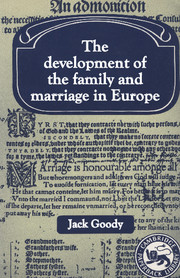Book contents
- Frontmatter
- Contents
- List of figures, maps and tables
- Preface
- 1 Perspectives
- 2 Two sides to the Mediterranean
- 3 Change in the German lands
- 4 Cousins and widows, adoptees and concubines
- 5 From sect to Church
- 6 Church, land and family in the West
- 7 Reformation and reform
- 8 The hidden economy of kinship
- 9 The spiritual and the natural
- Appendix 1 Kin groups: clans, lineages and lignages
- Appendix 2 From brideprice to dowry?
- Appendix 3 ‘Bilaterality’ and the development of English kin terminology
- References and bibliography
- Glossary
- Index
Appendix 2 - From brideprice to dowry?
Published online by Cambridge University Press: 05 June 2012
- Frontmatter
- Contents
- List of figures, maps and tables
- Preface
- 1 Perspectives
- 2 Two sides to the Mediterranean
- 3 Change in the German lands
- 4 Cousins and widows, adoptees and concubines
- 5 From sect to Church
- 6 Church, land and family in the West
- 7 Reformation and reform
- 8 The hidden economy of kinship
- 9 The spiritual and the natural
- Appendix 1 Kin groups: clans, lineages and lignages
- Appendix 2 From brideprice to dowry?
- Appendix 3 ‘Bilaterality’ and the development of English kin terminology
- References and bibliography
- Glossary
- Index
Summary
Many discussions about the nature of marriage and its associated transactions assume a long-term shift from bridewealth to dowry. The nineteenth century adopted the notion of a progression from promiscuity to marriage, first in the form of capture, then by purchase, later by dowry. In this century, too, many scholars dealing with the early history of European and Asian societies have attempted to see, in their fragmentary records, a movement from purchase (brideprice), or at least exchange (bridewealth), to dowry. In a useful summary of the evidence for Western Europe, the American historian, Howard, saw marriage in England as developing from ‘capture’, to ‘purchase’ (a payment to the father), to a payment to the bride by the groom (indirect dowry) and eventually to a payment made to her by her own parents (direct dowry). Even today many discussions are phrased in similar terms. The progression is sometimes linked, explicitly or implicitly, to supposed changes in the position of women (since ideas of ‘purchase’ tend to equate the members of that sex with chattels) as well as to the emergence of conjugal and affectionate families, based on love and individual choice rather than compulsion and sale. Typically these features are seen as contrasting the occidental structures of Europe with the oriental structures of North Africa and the Middle East.
- Type
- Chapter
- Information
- The Development of the Family and Marriage in Europe , pp. 240 - 261Publisher: Cambridge University PressPrint publication year: 1983



